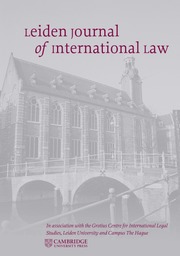(image source: LCDPU)
Book abstract:
Dominique Gaurier poursuit
avec ce second ouvrage traduit d'Alberico Gentili la série de ses traductions.
Celles-ci avaient déjà permis aux lecteurs francophones d’avoir affaire à des
textes plus fidèlement traduits que les anciennes traductions anglaises qui
avaient été principalement faites non par des juristes, mais par des
professeurs de latin dans leur ensemble, peu connaisseurs du droit romain.
Cette dernière traduction vient se rajouter aux deux autres précédentes portant
sur cette même question du droit des ambassades, déjà publiées par les PULIM.
Comme à son habitude, le traducteur présentera dans de nombreuses notes
également les traductions des passages repris du droit romain auxquels l’auteur
renvoie`; Il espère que cette dernière traduction favorisera un meilleur accès
à un auteur que tout le monde cite souvent sans vraiment avoir pu consulter
facilement ses ouvrages en langue latine, devenus souvent rares, voire
introuvables.
Table of contents:
Livre I sur les
ambassades du très illustre jurisconsulte Alberico Gentili
- Chapitre 1 Ceux qui sont appelés du nom d'ambassadeurs
- Chapitre 2 L'appellation multiple de cet ambassadeur dont nous allons parler et sa définition
- Chapitre 3 De l'ambassade sacrée
- Chapitre 4 Les répartitions des ambassades à partir des personnes de ceux qui sont envoyés et de ceux à qui elles sont envoyées
- Chapitre 5 Des différentes sortes d'ambassades suivant les commissions
- Chapitre 6 De l’ambassadeur de guerre
- Chapitre 7 Des ambassades officieuses
- Chapitre 8 De l’ambassade libre
- Chapitre 9 Ceux au soin desquels se trouve chez les Romains le soin d’envoyer et de recevoir les ambassadeurs
- Chapitre 10 Discussion sur un passage de Tacite [pour savoir] si ceux qui s’acquittent des ambassades étaient peut-être emmenés
- Chapitre 11 Des solennités des ambassades
- Chapitre 12 Du fécial et du père patrat
- Chapitre 13 Des herbes sacrées et des silex
- Chapitre 14 Explication du début de D. 33, 10, 7
- Chapitre 15 De l’endroit et du moment pour recevoir les ambassades
- Chapitre 16 Des présents et autres droits d’hospitalité que les Romains fournissaient aux ambassadeurs qui venaient à Rome
- Chapitre 17 Quel [était] l’usage des Grecs dans les ambassades ?
- Chapitre 18 Du caducée, des rameaux [d’olivier] entourés de bandelettes et des autre solennités
- Chapitre 19 Glanage [de ce qui a échappé]
- Chapitre 20 De la cause et de l’ancienneté des ambassades
Livre II sur les ambassades du très illustre jurisconsulte Alberico Gentili
- Chapitre 1 Du droit des ambassades
- Chapitre 2 De l’ambassade mensongère
- Chapitre 3 Les ambassadeurs seront-ils en sécurité même avec ceux vers qui ils n’ont pas été envoyés ?
- Chapitre 4 De l’ambassadeur espion et sans foi
- Chapitre 5 De l’ambassade interdite
- Chapitre 6 Celui qui a outragé les ambassadeurs d’autrui n’espérera pas conserver pour les siens le droit d’ambassade
- Chapitre 7 Y aura-t-il un droit d’ambassade avec des rebelles ?
- Chapitre 8 Il n’y a pas de droit d’ambassade avec des brigands
- Chapitre 9 Lors de désaccords civils, le droit d’ambassade restera-t-il ?
- Chapitre 10 Les ambassadeurs ne sont à bon droit envoyés ni par des sujets, ni à des sujets
- Chapitre 11 Des ambassades des criminels
- Chapitre 12 Du droit de la libre ambassade, [de l’ambassade] officieuse et [de l’ambassade] résidente
- Chapitre 13 Du droit de l’ambassade [qui a été] reçue
- Chapitre 14 Si le droit d’ambassade est dédaigné
- Chapitre 15 Des gens de la suite et des autres compléments ajoutés des ambassadeurs
- Chapitre 16 Des contrats des ambassadeurs
- Chapitre 17 Du juge des ambassadeurs
- Chapitre 18 Si un ambassadeur a comploté contre le prince auprès duquel il est ambassadeur
- Chapitre 19 Si un ambassadeur a commis quelque méfait, son prince ne doit pas être consulté
- Chapitre 20 Si un ambassadeur a mal parlé envers le prince, de la liberté de parole
- Chapitre 21 Des autres infractions et peines des ambassadeurs
- Chapitre 22 Du droit des ambassadeurs avec les leurs
- Chapitre 23 Du droit des coutumes envers ses propres ambassadeurs
Livre III sur les ambassades du tres illustre jurisconsulte Alberico Gentili
- Chapitre 1 Combien de grandes qualités devront se rassembler dans un ambassadeur our qu’il puisse exécuter son office
- Chapitre 2 Les choses extérieures que nous voulons voir rassembler dans un ambassadeur
- Chapitre 3 Un ambassadeur ne peut être privé de la nature et de bonnes [qualités]
- Chapitre 4 Les bonnes choses de la fortune doivent se rassembler dans un ambassadeur
- Chapitre 5 Il faut un ambassadeur qui se signale par son intelligence
- Chapitre 6 Pour qu’un ambassadeur soit un orateur [par excellence]
- Chapitre 7 L’ambassadeur tiendra l’idiome de celui chez lequel il agit
- Chapitre 8 On requiert dans un ambassadeur une grande connaissance de l’histoire
- Chapitre 9 Dans quelle mesure la philosophie conviendra-t-elle à un ambassadeur ?
- Chapitre 10 Des ambassadeurs lettrés
- Chapitre 11 De la loyauté des ambassadeurs
- Chapitre 12 Du courage des ambassadeurs
- Chapitre 13 De la modération des ambassadeurs
- Chapitre 14 De la prudence des ambassadeurs
- Chapitre 15 De la prudence et de la loyauté des ambassadeurs
- Chapitre 16 Un ambassadeur devra-t-il tromper son prince, s’il croit que c’est de l’intérêt [de ce dernier] ?
- Chapitre 17 De la force d’une libre commission
- Chapitre 18 De la prudence et du courage des ambassadeurs
- Chapitre 19 Du fait de défendre la dignité de l’ambassade
- Chapitre 20 De la prudence et de la tempérance des ambassadeurs
- Chapitre 21 Des raisons d’un ambassadeur prudent
- Chapitre 22 Du parfait ambassadeur
Index des personnages cités dans l’ouvrage
- Chapitre 1 Ceux qui sont appelés du nom d'ambassadeurs
- Chapitre 2 L'appellation multiple de cet ambassadeur dont nous allons parler et sa définition
- Chapitre 3 De l'ambassade sacrée
- Chapitre 4 Les répartitions des ambassades à partir des personnes de ceux qui sont envoyés et de ceux à qui elles sont envoyées
- Chapitre 5 Des différentes sortes d'ambassades suivant les commissions
- Chapitre 6 De l’ambassadeur de guerre
- Chapitre 7 Des ambassades officieuses
- Chapitre 8 De l’ambassade libre
- Chapitre 9 Ceux au soin desquels se trouve chez les Romains le soin d’envoyer et de recevoir les ambassadeurs
- Chapitre 10 Discussion sur un passage de Tacite [pour savoir] si ceux qui s’acquittent des ambassades étaient peut-être emmenés
- Chapitre 11 Des solennités des ambassades
- Chapitre 12 Du fécial et du père patrat
- Chapitre 13 Des herbes sacrées et des silex
- Chapitre 14 Explication du début de D. 33, 10, 7
- Chapitre 15 De l’endroit et du moment pour recevoir les ambassades
- Chapitre 16 Des présents et autres droits d’hospitalité que les Romains fournissaient aux ambassadeurs qui venaient à Rome
- Chapitre 17 Quel [était] l’usage des Grecs dans les ambassades ?
- Chapitre 18 Du caducée, des rameaux [d’olivier] entourés de bandelettes et des autre solennités
- Chapitre 19 Glanage [de ce qui a échappé]
- Chapitre 20 De la cause et de l’ancienneté des ambassades
Livre II sur les ambassades du très illustre jurisconsulte Alberico Gentili
- Chapitre 1 Du droit des ambassades
- Chapitre 2 De l’ambassade mensongère
- Chapitre 3 Les ambassadeurs seront-ils en sécurité même avec ceux vers qui ils n’ont pas été envoyés ?
- Chapitre 4 De l’ambassadeur espion et sans foi
- Chapitre 5 De l’ambassade interdite
- Chapitre 6 Celui qui a outragé les ambassadeurs d’autrui n’espérera pas conserver pour les siens le droit d’ambassade
- Chapitre 7 Y aura-t-il un droit d’ambassade avec des rebelles ?
- Chapitre 8 Il n’y a pas de droit d’ambassade avec des brigands
- Chapitre 9 Lors de désaccords civils, le droit d’ambassade restera-t-il ?
- Chapitre 10 Les ambassadeurs ne sont à bon droit envoyés ni par des sujets, ni à des sujets
- Chapitre 11 Des ambassades des criminels
- Chapitre 12 Du droit de la libre ambassade, [de l’ambassade] officieuse et [de l’ambassade] résidente
- Chapitre 13 Du droit de l’ambassade [qui a été] reçue
- Chapitre 14 Si le droit d’ambassade est dédaigné
- Chapitre 15 Des gens de la suite et des autres compléments ajoutés des ambassadeurs
- Chapitre 16 Des contrats des ambassadeurs
- Chapitre 17 Du juge des ambassadeurs
- Chapitre 18 Si un ambassadeur a comploté contre le prince auprès duquel il est ambassadeur
- Chapitre 19 Si un ambassadeur a commis quelque méfait, son prince ne doit pas être consulté
- Chapitre 20 Si un ambassadeur a mal parlé envers le prince, de la liberté de parole
- Chapitre 21 Des autres infractions et peines des ambassadeurs
- Chapitre 22 Du droit des ambassadeurs avec les leurs
- Chapitre 23 Du droit des coutumes envers ses propres ambassadeurs
Livre III sur les ambassades du tres illustre jurisconsulte Alberico Gentili
- Chapitre 1 Combien de grandes qualités devront se rassembler dans un ambassadeur our qu’il puisse exécuter son office
- Chapitre 2 Les choses extérieures que nous voulons voir rassembler dans un ambassadeur
- Chapitre 3 Un ambassadeur ne peut être privé de la nature et de bonnes [qualités]
- Chapitre 4 Les bonnes choses de la fortune doivent se rassembler dans un ambassadeur
- Chapitre 5 Il faut un ambassadeur qui se signale par son intelligence
- Chapitre 6 Pour qu’un ambassadeur soit un orateur [par excellence]
- Chapitre 7 L’ambassadeur tiendra l’idiome de celui chez lequel il agit
- Chapitre 8 On requiert dans un ambassadeur une grande connaissance de l’histoire
- Chapitre 9 Dans quelle mesure la philosophie conviendra-t-elle à un ambassadeur ?
- Chapitre 10 Des ambassadeurs lettrés
- Chapitre 11 De la loyauté des ambassadeurs
- Chapitre 12 Du courage des ambassadeurs
- Chapitre 13 De la modération des ambassadeurs
- Chapitre 14 De la prudence des ambassadeurs
- Chapitre 15 De la prudence et de la loyauté des ambassadeurs
- Chapitre 16 Un ambassadeur devra-t-il tromper son prince, s’il croit que c’est de l’intérêt [de ce dernier] ?
- Chapitre 17 De la force d’une libre commission
- Chapitre 18 De la prudence et du courage des ambassadeurs
- Chapitre 19 Du fait de défendre la dignité de l’ambassade
- Chapitre 20 De la prudence et de la tempérance des ambassadeurs
- Chapitre 21 Des raisons d’un ambassadeur prudent
- Chapitre 22 Du parfait ambassadeur
Index des personnages cités dans l’ouvrage
The book comes
with a CD-ROM (MS-DOS/Macintosh).
(more information
with the publisher)







